- Home
- David Downing
Stattin Station jr-3 Page 4
Stattin Station jr-3 Read online
Page 4
Dallin thought for a moment. 'I don't get it,' he said eventually. 'Is there a connection?'
'Canaris doesn't mind you - us - supporting the British, in fact he wants that to continue, because one thing he dreads is a German victory in the West. But he doesn't want us joining up with the Russians, because the other thing he dreads is a German defeat in the East. So his main aim is to prevent that happening, to keep the two wars separate. The statistics are supposed to convince us that the Soviets will avoid defeat whether we help them or not, and the separate peace rumour - which is almost certainly a fiction - suggests that helping them would be against our own interests, and that any tanks we send them might eventually be used against us.'
Dallin looked suitably confused. 'Does the Admiral know which side he's on?'
'Good question. He hates communists as much as he hates Nazis, and he probably hates democrats too. But now that the Kaiser's gone there's not much else on offer. I think the only thing you can say for certain about Canaris is that he is a German patriot. He wants Germany - his Germany, not Hitler's - to survive the war, and that will only happen if the Russians and their German communist allies are kept at arm's length, and if Hitler and the Nazis are deposed, allowing Canaris and a few like-minded generals to strike a deal with the West. None of which is impossible, but as a sequence of events you'd have to say it was pretty unlikely.'
'Oh, I don't know,' Dallin said, rubbing his hands together. 'Look how eager you Brits were to push Hitler east, until someone in London had the bright idea of guaranteeing Poland.'
'True, but Churchill wouldn't do a deal last year, and I'd say Britain's position is stronger now than it was then.'
'Unless Moscow really does fall.'
'It won't.'
'You have some private intelligence?'
'Nope. Just a hunch.' Or just wishful thinking, he thought to himself. 'What have you got for the Admiral?' he asked.
'Only one thing really. We want the Admiral to understand that if the Japs attack us in Asia, we won't just meet them head on, we'll also declare war on Germany. Tell him that we'll have no choice, because our strategic plan calls for fighting and winning a European war before we deal with the Nips.'
'Is that true?'
'Who knows? But if the Germans believe it, it might encourage them to restrain the Japanese for a few months more. And if the Japs don't take any notice and attack us, Hitler might reckon we're going to attack him anyway, and be fool enough to get his declaration in first. Which would save Roosevelt the job of persuading Congress that the two wars were one and the same.'
'Nice,' Russell said. 'How are things going in Washington? With the Japanese, I mean?'
'Time is definitely running out, which brings me to another matter. You remember Franz Knieriem?'
It was not a name that Russell had been hoping to hear. 'Vaguely,' he lied.
'He was one of the men on that list you were given in New York, back in '39. An official at the Air Ministry. You decided against contacting him.'
'I remember.'
'Why?'
Russell thought back. He had engineered an innocent meeting with the man, and had decided to take it no further. The credentials had been perfect - an ex-Social Democrat with a brother who had died in Dachau, an effusive character reference from an old colleague now living in America - and the possibility of gaining access to restricted Air Ministry files had certainly appealed to Washington; but Russell had formed an instinctive distrust of the man. Franz Knieriem, he had decided, might well be the death of him.
But how to explain that to Dallin? 'I just didn't trust him,' he said, knowing how inadequate it sounded.
'Nothing stronger than that?' Dallin predictably asked. 'Because we need you to try again. We'll probably be out of here in a few weeks, and the chance will be gone. Look, I'll tell you what we need to know and why. Last June, when Hitler was in Florence, he told Mussolini that he would have a trans-Atlantic bomber ready for service by the end of this year. One that could make it to New York and back from the Azores. Now we haven't found a trace of this bomber, and it may just be a figment of Hitler's imagination, but, something like this, we have to be sure. New Yorkers don't want to be settling down to a Yankee game next season and suddenly find there are German bombers overhead.'
'It doesn't sound very plausible, does it?'
'No, but we can't afford to ignore the possibility.'
And I can't afford to take the risk, Russell thought.
'If the guy calls the Gestapo, you can just make a run for the Consulate,' Dallin suggested, as if this was something people did every day.
'They'd come in and get me.'
'Why? The cat would be out of the bag, and creating a diplomatic incident wouldn't put it back in again.'
'And my girlfriend? You've already told me that there's nothing you could do for her.'
'There isn't. At least, I don't think so. Let me have another try, see what I can do. In the meantime, will you at least think about it? If we get into the war, you'll be separated from your girlfriend anyway.'
'I'll give it some thought,' Russell said, seeing no point in a blank refusal.
But he had no desire to contact Knieriem again. The way things were going, Dallin and Company would soon be gone, and he was confident he could string the matter out until they were.
It was getting dark when the studio limousine dropped Effi off at the main entrance of the Elisabeth Hospital. She had been visiting the wounded once a week for a couple of months now, a willing participant in Goebbels' latest campaign to raise morale among the troops. There were supposed to be three of them there tonight, but the other two had cried off, one actress claiming a headache, the other a queasy stomach. The experience was generally depressing, but it was only a couple of hours, and Effi had felt like flaying them.
An orderly insisted on escorting her through the maze of corridors, happily chatting as they walked - he seemed to remember her films better than she did. Reaching the first of the military wards, she announced her arrival to the staff nurse, Annaliese Huiskes, whom she knew from previous visits.
'Anyone you particularly want me to see?' Effi asked.
'No. Just as many as you can manage. They'll all be delighted.'
A bit of an exaggeration, Effi thought, as she headed for the visitor-less bed. There were always quite a few who were happy to see her, but some had visitors of their own, and others simply turned their heads in mute refusal. Those that welcomed her would often ask about her work, and which other stars she had met. Some would flirt, but more wanted to talk about their girlfriends and wives. The hardest were those who had lost limbs or suffered other disfigurement, and were fearful that they would no longer be wanted.
Her first man - boy, really - was initially almost too star-struck to talk. She slowly won him round, asking the usual questions about family and friends and how he was mending, trying to satisfy his curiosity about life in Babelsberg and the glamorous world of movies. Eventually she was passed, like a prize that had to be shared, from patient to patient and on into the next ward, down a queue of stunned or frightened faces that formed a knot in her throat and brought her perilously close to tears.
Most of the men refused to talk about the war, but those who were willing could talk of little else. 'You can't imagine what's it's like,' they would say, some resentfully, others almost in wonderment, as if they themselves were already finding it hard to credit their memories.
'So tell me,' Effi would reply.
'You're better off not knowing,' the soldiers would say, almost proudly.
'It's always better to know,' Effi would say, though some of the stories gave her reason to doubt it. The boy of eighteen showered with the flesh of his best friend, suddenly headless trunks collapsing in almost comic slow motion, the constant fear of losing one's genitals and no longer being a man.
And then there was the guilt. They had all done it - arriving in a Russian village, stealing the food and the shelter, pus
hing women and children out into the dark and the cold. 'It was them or us - what else could we do?'
'And what if they resist?'
'Then we shoot them. The children too. Once you've shot the mother you have to shoot the children. How would they survive on their own?'
Her last patient, a young man in his mid-twenties with neat blond hair and the sort of rugged outdoor face which the Propaganda Ministry liked on its posters, had needed shrapnel removing from his neck, but seemed set for a quick recovery. His mind, though, was in such turmoil that he could hardly lie still, twisting his head this way and that, convincing Effi that he would rip out the stitches that criss-crossed his throat. 'The Russians will fight on,' he told Effi, as if he was resuming an interrupted conversation. 'They can't retreat and they can't surrender, so what else can they do? If they retreat then their people shoot them, if they surrender then either we shoot them or they starve. There's no food for prisoners. That's just the way it is. But you can't fight an enemy that won't retreat or surrender. You just have to keep killing and killing and hope that he'll run out of soldiers before we do. But he won't, will he?' the soldier almost shouted. 'The Fuhrer must know this, so why does he keep telling us to attack?'
'Sssshhh,' Effi said, afraid the man would talk himself into trouble. 'We can't know what the Fuhrer knows. He may be getting false reports from his generals.'
The man's eyes lit up. 'That must be it. Someone should tell him. You should tell him. You're famous.'
'I will,' Effi promised.
'All my friends are dead,' he said.
'You're not,' Effi said. 'And you have to get better, and get back to your wife and children. They need you.'
The soldier gave her a questioning look, as if to check her sincerity. 'You're right,' he said without conviction. 'I must get better.'
As she leaned over to kiss him on the forehead she saw tears glistening in his eyes.
Visiting time was over, and she made her way back down the wards, smiling at the men she had spoken to. Annaliese Huiskes was sitting back in her chair, a glass of pinkish liquid in her hand, looking as tired as Effi felt. She was almost thirty, Effi knew, and prettier than she looked tonight.
'Come in,' Huiskes said, reaching inside a desk drawer for a bottle and a second glass. 'Have a drink.'
'Of what?' Effi asked.
'Hospital schnapps. We have the raw alcohol, and one of the doctors is good at giving it different flavours. This one's not bad.'
A drink did seem like a good idea, and it tasted no worse than some of the cocktails that the better hotels were now serving up.
'How did it go?' Huiskes asked.
Effi sighed. 'I hope I help. Some of them anyway. The last man I saw - Becker was the name above the bed - seemed very disturbed.'
'I'll leave a note for the night shift. But he's one of the luckier ones.' She drained her glass, looked at the bottle, and abruptly returned it to the desk drawer. 'It's hard to keep track,' she said. 'There're so many coming and going - more than ever these last few weeks. I hope that just means that we're getting a larger share than before, but who knows? I have a friend in the SS Hospital, and that sounds even worse. One night one of her patients started screaming, 'I can't do it anymore!' and most of the others joined in, until half the ward was screaming and the other half weeping.'
'Do what, I wonder,' Effi murmured.
'Killing people, of course. In their hundreds, thousands even. Jews mostly, but Russians too. They force them to dig huge graves, line them up on the side, and then shoot them. Row after row. Her patients can't stop talking about it, she says.'
'Why?' Effi wanted to know. 'Why are they shooting so many?'
Annaliese shrugged. 'Who knows? I haven't heard from my Gerd for weeks,' she added, as if he might have the answer.
'Where is he?'
'Somewhere in the south. He's with 60th Motorised. I worry about him not coming back, and I worry about who he'll be if he does come back.'
After the meeting with Dallin, Russell had walked the short distance south to the Abwehr headquarters, a five-storey building on Tirpitz Ufer overlooking the Landwehrkanal. The Section 1 offices seemed busy, but section chief Colonel Hans Piekenbrock only made him wait a few moments. After listening to Russell's report of what Dallin had said, the Colonel made a face. 'Is that all?'
'Yes.'
'Very well.'
'But there is one other thing.'
'Yes?'
'When I started working for the Abwehr in this way I made it clear to the Admiral that I could not continue doing so if Germany became involved in a war with my own country.'
'I believe that was the understanding,' Piekenbrock agreed.
'So I will be permitted to leave with all the other journalists?'
'That is my understanding,' the Colonel confirmed.
'That's all I wanted to know,' Russell said, getting up. He only wished he could believe it.
It had grown visibly darker during his brief visit, and the chances of his reaching the second daily press conference on time were remote. But why bother? He wasn't going to learn anything significant, and if one of Goebbels' minions inadvertently let something slip, he wouldn't be allowed to file it. His job was a joke, whichever way he looked at it.
He turned west along the canal towpath, thinking Effi might be home early for once, only to remember as he reached the Cornelius Bridge that this was her hospital night. A drink, he thought, and after skirting round the Zoo he made tracks for the bar on the Ku'damm where he'd last encountered some real whisky. Crossing Hardenbergstrasse he suddenly remembered that Effi's last film was showing just up the road at the Ufa-Palast.
She had, unusually for her, refused to see the film with him when it first came out, and he had never gotten around to seeing it on his own. He walked on up to the giant cinema, which had been the largest in Europe until Hamburg built a bigger one. The early evening showing was beginning in less than fifteen minutes.
There was a long queue at the box office, and the cinema itself was more crowded than he expected, with over three-quarters of the seats filled. Russell settled into an aisle seat near the front, just as the recorded orchestra struck up a rousing theme over shots of the German countryside. The film was dedicated to those Germans whose forefathers had emigrated to the East and faced the ensuing hardships, chief among which, it soon transpired, was proximity to Poles.
Effi soon appeared on screen, sporting a Brunhilde hairstyle and dressed like Babelsberg's idea of a humble schoolteacher. Watching her, Russell always felt an absurd pride, as if he had anything to do with how good she was. She dismissed her loving class of bright young Germans and walked home through the town, accompanied by looks from the local Poles which mingled disgust and lechery in equal measure. Her father, the local German doctor, was waiting with news that the German hospital was being closed down.
So far, so predictable, Russell thought; but as the film unfolded he was left with a grudging respect for its makers. It could have been so much worse - such films usually were. This one occasionally teetered on the edge of unintentional farce - the scenes with the Jews were risible as ever - but in general the temptation to over-egg the pudding was manfully resisted. For once in Babelsberg's Nazi life, actions were allowed to speak louder than the cartoon villains, and it worked. Once Effi's father had been beaten to death, his lawyer friend shot and blinded and another young girl treated to a stoning, the audience were ready for Effi's reluctant declaration of war on the local Poles. In her final stirring speech, delivered to her fellow Germans after they'd all been imprisoned for listening to a Fuhrer broadcast, she painted an idealistic picture of the future, and the Reich of which they'd soon be a part, where 'all around the birds are singing and everything is German.' In a bad film it would have sounded ludicrous, but in this one it somehow worked - by this time even Russell found himself rooting for the poor beleaguered minority, and very upset by the final shooting of Effi's character. When the Wehrmacht arrived to pu
t things right, he felt like shaking a fist though, unlike many in the audience, refrained from actually doing so.
Making his way out of the cinema, he understood why Effi had not wanted him to see it. It was a powerful film. All those German families - and there were millions of them now - whose sons were away in Russia or Yugoslavia or Africa would feel better about their being there. And if the dreaded letter should arrive, they would have some consolation in knowing that their sons had died for such an irrefutably noble cause. Effi had been that convincing.
Arriving home to the empty apartment, Russell realised he had not bought any food. There were plenty of potatoes though, one rather sad looking onion, and an egg, which he decided to save. He sliced both as thinly as he could, and placed them in a frying pan with salt and a little ersatz butter over a low heat. They were browning nicely when Effi arrived.
She threw her bag down, burrowed into his arms and squeezed him as tightly as she could. They kissed.
'Hello,' she said.
'You've been drinking,' he said, tasting the schnapps on her breath. She looked exhausted.
'I certainly have, and I feel like more. Is there any wine left?'
Russell poured her a glass. 'I saved you an egg.'
'I've eaten.' Hours ago, but she didn't feel hungry. 'Put the egg in the potatoes, and I'll have a taste.'
Russell did as he was told. 'Another early start in the morning?'
'Oh yes. All this week, but that should do it.'
'How was the hospital?'
'The same as ever. Terrible. Heartbreaking. Infuriating. It's impossible not to feel sorry for most of them, but some of the things they admit to... it's hard not to feel that they deserve everything that's happened to them. I know they're just following orders, so it's not really their fault, but it is their fingers on the triggers. But... I don't know. What would any of us do in the same situation?'
Russell stirred in the egg. 'The one thing I do know is how hard it is to break ranks. The pressure to conform, to go along with the consensus, is enormous. You need virtually everyone on board to start a mutiny.'

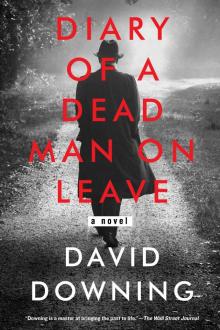 Diary of a Dead Man on Leave
Diary of a Dead Man on Leave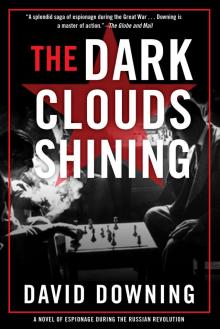 The Dark Clouds Shining
The Dark Clouds Shining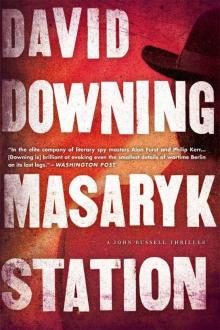 Masaryk Station (John Russell)
Masaryk Station (John Russell) Zoo Stationee
Zoo Stationee Zoo Station jr-1
Zoo Station jr-1 Masaryk Station
Masaryk Station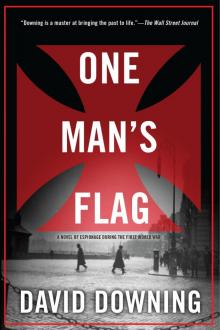 One Man's Flag
One Man's Flag Potsdam Station jr-4
Potsdam Station jr-4 Stattin Station jr-3
Stattin Station jr-3 Masaryk Station jr-6
Masaryk Station jr-6 Silesian Station (2008) jr-2
Silesian Station (2008) jr-2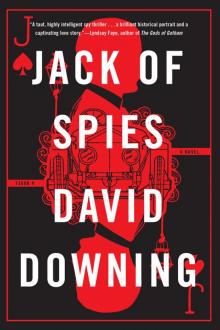 Jack of Spies
Jack of Spies Silesian Station (2008)
Silesian Station (2008) The Moscow Option
The Moscow Option The Red Eagles
The Red Eagles Zoo Station
Zoo Station Lehrter Station
Lehrter Station Lehrter Station jr-5
Lehrter Station jr-5